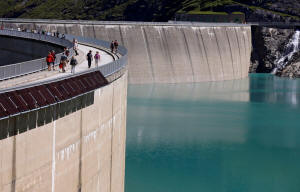|
Satellite data showed that water sequestered in 7,245 reservoirs
across the world fell from 1999 to 2018, despite a 28 cubic
kilometre annual increase in capacity, a study published by
Nature Communications said.
Climate change was a "critical factor" in reducing reservoir
efficiency, said lead author Huilin Gao of Texas A&M University,
but rising water demand also played a role.
"Even if temperatures stop rising, increasing demand and new
construction are likely to continue," she added.
The decline in storage volumes was concentrated in the south,
especially Africa and South America, where water demand
increased rapidly and new reservoirs didn't fill up as quickly
as expected.
The study did not account for the impact of sedimentation, a
persistent problem that is predicted to cut storage capacity by
a quarter by 2050, according to a January paper by the United
Nations University.
Lengthy droughts have raised questions about the feasibility of
large reservoirs. China saw hydropower output plummet last
summer as a result of record-high temperatures across the
Yangtze basin.
The International Hydropower Association said last week that new
dams and reservoirs played a "crucial mitigating role in an era
of increasing climate extremes", making it easier to regulate
water flows.
"As the climate gets more volatile, we will need more, not less,
water infrastructure, with the bonus of much-needed low-carbon
electricity," it said.
China has also repeatedly said its enhanced ability to store and
release water on the upper reaches of the Yangtze has alleviated
downstream floods and droughts.
Unlike many regions, China's storage levels increased slightly
over 1999-2018 as a result of higher run-off in major river
basins, suggesting it will benefit from new reservoirs, Gao
said.
"But this highly depends on future climate, especially since
most regions have experienced decreasing run-off," she said.
(Reporting by David Stanway; Editing by Gerry Doyle)
[© 2023 Thomson Reuters. All rights
reserved.] Copyright 2022 Reuters. All rights reserved. This material may not be published,
broadcast, rewritten or redistributed.
Thompson Reuters is solely responsible for this content.

|
|



